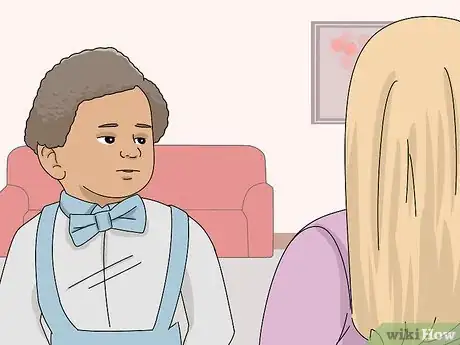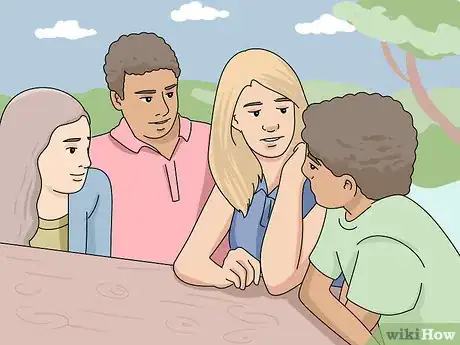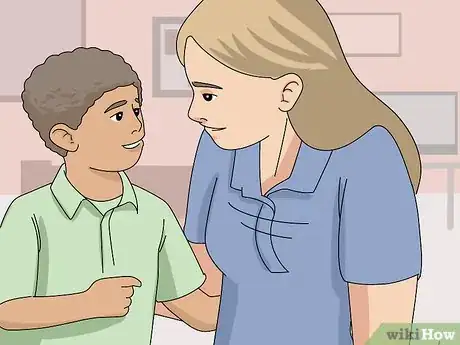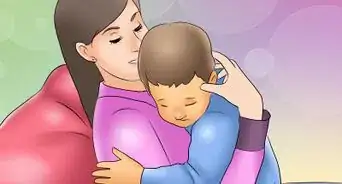This article was co-authored by wikiHow staff writer, Megaera Lorenz, PhD. Megaera Lorenz is an Egyptologist and Writer with over 20 years of experience in public education. In 2017, she graduated with her PhD in Egyptology from The University of Chicago, where she served for several years as a content advisor and program facilitator for the Oriental Institute Museum’s Public Education office. She has also developed and taught Egyptology courses at The University of Chicago and Loyola University Chicago.
There are 8 references cited in this article, which can be found at the bottom of the page.
This article has been viewed 27,185 times.
Learn more...
Telling your child that they are adopted can be challenging. You may be afraid of how they will react, or worried about exactly how and when to break the news. You can help your child and yourself feel more comfortable and confident by telling them as early as possible and keeping your discussions open and honest. You might also find it helpful to use other resources, like positive books and movies about adoption. Your child will likely have a lot of different emotions about their adoption, so do your best to be supportive and accepting of whatever they feel.
Steps
Having a Conversation with Your Child
-
1Tell your child as early as possible. The earlier you talk to your child about their adoption, the easier it will be for them to come to terms with the idea. If possible, start talking to your child about their adoption while they are still preschool-aged.[1]
- If you wait too long to talk to your child about their adoption, there’s a chance they could find out first from another relative, friend, or acquaintance. It’s best that they hear the news from you, since this will help establish trust with your child and allow you to tell them in the way you think is best.[2]
- Choose a time when you and your child are both in a good mood and not likely to be distracted or interrupted.
Tip: Children often start asking questions about where babies come from when they are in preschool. If your child starts asking questions like this, take it as an opportunity to discuss their adoption.
-
2Be positive when discussing your child’s adoption. If you speak positively about the adoption, your child will be less likely to feel upset or uncomfortable about it. Tell your child how happy you were to bring them into your family, and how much you love them.[3]
- For example, you might say something like, “Your mommy and I love you so much. We were so happy and excited when you became part of our family!”
- Avoid saying anything negative about your child’s birth parents, since they are also an important part of your child’s story.[4]
Advertisement -
3Keep your explanation simple and age appropriate. Eventually, your child will have plenty of questions about the details of their adoption and their birth family. When you first tell them, however, try not to overwhelm them with details. Instead, give them a very basic and straightforward explanation of where they came from.[5]
- For example, when talking to your preschooler, you might say, “When you were born, your mama couldn’t take care of you. So, your daddy and I decided to adopt you and become your parents. Now you’re part of our family forever.”
- Don’t give your child details that might be confusing or upsetting. For example, if their birth parents were abusive or neglectful, now is not the time to bring it up.
-
4Answer your child’s questions clearly and honestly. It’s natural for your child to be curious and anxious about their background. They may ask questions about what their birth parents are like, where they are now, and why they chose to put your child up for adoption. They might also ask questions about how they came to be with you. Answer these questions to the best of your ability, but keep your answers simple and appropriate to your child’s age or developmental level.[6]
- For example, your child might ask, “What happened to my other parents?” You could say something like, “They live in another town. Sometimes I write them letters to let them know how you’re doing!”
- Be patient with your child even if they ask the same questions over and over again.
- Try to anticipate questions your child might have so you can address them before your child even brings them up. This will help them feel more comfortable talking to you about the subject and bringing up questions of their own.[7]
-
5Talk about adoption regularly with your child. The more you discuss your child’s adoption, the more comfortable they will feel with the idea. Instead of having one big talk about adoption, bring it up regularly so that it becomes a normal and matter-of-fact part of your child’s life.[8]
- For example, you could regularly share memories with your child of the day when you first brought them home.
- Try saying things like, “You’re getting so tall! Your birth father was really tall, too.”
- You could also show your child pictures from when you adopted them, or incorporate ideas about adoption into storytelling and roleplay.[9]
Getting Outside Support
-
1Look for books about adoption that you can share with your child. Reading books about adoption with your child is a great way to bond with them and help them understand their background. Buy some age-appropriate books on adoption or check some out from your local library.[10]
- For example, you might read a book like Happy Adoption Day! by John McCutcheon and Julie Paschkis with a preschooler. If your child is elementary school aged, try a book like Tell Me Again About the Night I Was Born by Jamie Lee Curtis and Laura Cornell.[11]
-
2Show your child positive media with adopted characters. Movies and TV shows with positive depictions of adoptive families can also help your child feel more confident and comfortable about their background. Watch them together with your child so that you can answer their questions and talk about how the characters’ situations relate to your child’s life and experiences.[12]
- For example, preschool-aged kids might enjoy shows like Dinosaur Train, which features an adopted character. Sesame Street also has episodes that address the issue of adoption.
- For an older child, try movies like Kung Fu Panda 2 and Earth to Echo that address issues related to adoption and foster care.
-
3Get advice from your child’s social worker. If you’ve been working with a social worker throughout your child’s adoption process, they can be a great resource for helping you work out how to talk to your child about adoption. Ask for their advice on how and when to tell your child, as well as how to deal with tough questions and difficult emotions.[13]
- If you’re not in touch with a social worker at this point, try asking your child’s pediatrician to recommend someone that you can talk to.
- One of your child’s teachers or other caregivers may also be able to offer advice.
-
4Reach out to other adoptive parents for support and advice. Other adoptive parents can offer you great insights into how to deal with these difficult issues. You may have already built up a support network of other adoptive parents during the initial adoption process. If not, do a search online for adoptive parent support groups in your area.[14]
- If you live in the U.S., you can search for support groups and other helpful resources through the Child Welfare Information Gateway’s National Foster Care and Adoption Directory Search, here: https://www.childwelfare.gov/nfcad/.
Tip: Some schools have parent groups that work with the school’s teachers and administration to develop inclusive curriculum for kids from adoptive or non-traditional families. Reach out to your child’s school and find out if they have any special resources available for adoptive parents and kids.[15]
Dealing with Your Child’s Emotions
-
1Be prepared for your child to have complicated emotions. Your child may experience a mixture of different emotions about their adoption. Those emotions may change or become more complex as they get older. They may feel angry, confused, sad, anxious, or wistful about their birth family. While it’s difficult to see your child experiencing these feelings, keep in mind that these are totally normal and natural reactions.[16]
- Your child may have both positive and negative feelings about their adoption. Give them space to experience and express all of those feelings without judgment.[17]
-
2Validate your child’s feelings about their adoption. However your child feels about their adoption, it’s important to be supportive and understanding. Don’t try to dismiss or minimize their feelings, even if they seem excessive or unwarranted to you. Instead, let them know that you hear what they are saying and that you understand what they are feeling, and remind them that you love them and are there for them no matter what.[18]
- For example, you might say, “It sounds like you’re really angry that your birth mother hasn’t made more of an effort to be a part of your life, and you feel rejected. I know that must be a terrible feeling.”
-
3Offer your child reassurance if they need it. It’s natural for your child to feel insecure about themselves and about your feelings for them. They may feel that their birth parents rejected them and that they could be rejected again, or they might wonder if their bond with you is somehow less “real” than the bond between other children and their biological parents. If your child expresses these feelings, reassure them that you love them unconditionally and that you are their forever family.[19]
- You could say something like, “We love you very much, and you will always be our daughter. Any time you want to talk, we’re here for you.”
-
4Avoid putting pressure on your child to feel a certain way about their adoption. You or other well-meaning family members may be tempted to emphasize how lucky your child is to be adopted, or to tell them that you adopted them because they are special. While these ideas sound positive, they can also put a lot of pressure on your child. They might feel guilty that they are not more grateful, or feel like they need to be extra special or exceptional to be worthy of your love.[20]
- Instead, focus on your own gratitude for having them in your life. Let them know that you love them unconditionally for who they are.
-
5Give yourself space to get emotional as well. Talking to your child about their adoption is bound to be difficult and emotional for you as well as for them. While you should try to be calm and confident while talking about these issues with your child, remember that it’s okay for you to have strong feelings about it. Acknowledge your own emotions without judgment.[21]
- If you’re having a hard time processing your own emotions, consider talking to a counselor or to other adoptive parents in a support group. They can help you come to terms with how you are feeling.
Tip: If you find yourself getting really upset while talking to your child, excuse yourself to calm down. Say something like, “I just need a minute to think about how to help you with your questions.”[22]
Community Q&A
-
QuestionI have an adopted daughter that I found in an alley when she was a baby. Her birth mother signed her rights away as a mother. I want to explain it when she is old enough. What can I do?
 Community AnswerFollow the steps in the article. Talk to her in a calm place, and don't get angry or mad or upset. Tell her you love her and you don't want her upset, make it feel like you are on her side.
Community AnswerFollow the steps in the article. Talk to her in a calm place, and don't get angry or mad or upset. Tell her you love her and you don't want her upset, make it feel like you are on her side.
References
- ↑ https://www.healthychildren.org/English/family-life/family-dynamics/adoption-and-foster-care/Pages/When-to-Tell-Your-Child-About-Adoption.aspx
- ↑ https://www.familylives.org.uk/advice/your-family/fostering-adoption-kinshipcare/how-to-tell-your-child-they-are-adopted/
- ↑ https://www.familylives.org.uk/advice/your-family/fostering-adoption-kinshipcare/how-to-tell-your-child-they-are-adopted/
- ↑ https://psychcentral.com/lib/how-to-tell-your-child-theyre-adopted/
- ↑ https://www.healthychildren.org/English/family-life/family-dynamics/adoption-and-foster-care/Pages/When-to-Tell-Your-Child-About-Adoption.aspx
- ↑ https://www.healthychildren.org/English/family-life/family-dynamics/adoption-and-foster-care/Pages/When-to-Tell-Your-Child-About-Adoption.aspx
- ↑ https://psychcentral.com/lib/how-to-tell-your-child-theyre-adopted/
- ↑ https://psychcentral.com/lib/how-to-tell-your-child-theyre-adopted/
- ↑ https://www.familylives.org.uk/advice/your-family/fostering-adoption-kinshipcare/how-to-tell-your-child-they-are-adopted/
- ↑ https://www.pbs.org/parents/thrive/how-to-tell-your-child-she-is-adopted
- ↑ https://www.pbs.org/parents/thrive/books-about-adoption
- ↑ https://www.pbs.org/parents/thrive/how-to-tell-your-child-she-is-adopted
- ↑ https://www.pbs.org/parents/thrive/how-to-tell-your-child-she-is-adopted
- ↑ https://psychcentral.com/lib/how-to-tell-your-child-theyre-adopted/
- ↑ https://www.nacac.org/resource/adoption-and-the-schools/
- ↑ https://www.healthychildren.org/English/family-life/family-dynamics/adoption-and-foster-care/Pages/When-to-Tell-Your-Child-About-Adoption.aspx
- ↑ https://psychcentral.com/lib/how-to-tell-your-child-theyre-adopted/
- ↑ https://www.healthychildren.org/English/family-life/family-dynamics/adoption-and-foster-care/Pages/When-to-Tell-Your-Child-About-Adoption.aspx
- ↑ https://www.familylives.org.uk/advice/your-family/fostering-adoption-kinshipcare/how-to-tell-your-child-they-are-adopted/
- ↑ https://psychcentral.com/lib/how-to-tell-your-child-theyre-adopted/
- ↑ https://psychcentral.com/lib/how-to-tell-your-child-theyre-adopted/
- ↑ https://www.pbs.org/parents/thrive/managing-your-own-emotions-the-key-to-positive-effective-parenting








































































